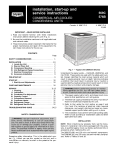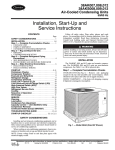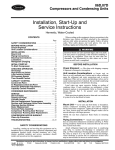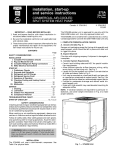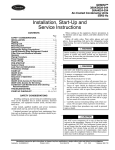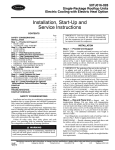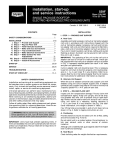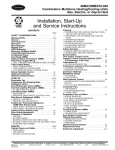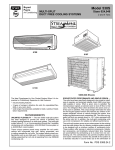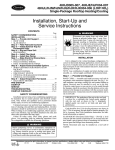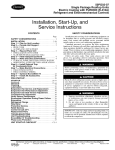Download Bryant 569C Troubleshooting guide
Transcript
installation, start-up and service instructions COMMERCIAL AIR-COOLED CONDENSING UNITS Cancels: II 569C-72-4 569C 576B II 569C-72-5 8/15/00 IMPORTANT — READ BEFORE INSTALLING 1. Read and become familiar with these installation instructions before installing this unit (Fig. 1). 2. Be sure the installation conforms to all applicable local and national codes. 3. These instructions contain important information for the proper maintenance and repair of this equipment. Retain these instructions for future use. CONTENTS Page SAFETY CONSIDERATIONS . . . . . . . . . . . . . . . . . . . . . . . . . 1 INSTALLATION . . . . . . . . . . . . . . . . . . . . . . . . . . . . . . . . . . .2-8 I. Locate the Unit . . . . . . . . . . . . . . . . . . . . . . . . . . . . . . 2 II. Rig and Place Unit . . . . . . . . . . . . . . . . . . . . . . . . . . . 2 III. Compressor Mounting. . . . . . . . . . . . . . . . . . . . . . . . 2 IV. Unit Refrigerant Piping Connections . . . . . . . . . . . . 2 V. Electrical Connections . . . . . . . . . . . . . . . . . . . . . . . 5 VI. Accessory Installation. . . . . . . . . . . . . . . . . . . . . . . . 8 PRE-START-UP . . . . . . . . . . . . . . . . . . . . . . . . . . . . . . . . . . . . 8 START-UP . . . . . . . . . . . . . . . . . . . . . . . . . . . . . . . . . . . . . . . . 9 I. Start-Up and Adjustments . . . . . . . . . . . . . . . . . . . . 9 CARE AND MAINTENANCE . . . . . . . . . . . . . . . . . . . . . . . . . 9 SERVICE . . . . . . . . . . . . . . . . . . . . . . . . . . . . . . . . . . . . . 10-12 I. Cleaning . . . . . . . . . . . . . . . . . . . . . . . . . . . . . . . . . . 10 II. Lubrication . . . . . . . . . . . . . . . . . . . . . . . . . . . . . . . . 10 III. Condenser-Fan Adjustment . . . . . . . . . . . . . . . . . . 10 IV. Capacity Control . . . . . . . . . . . . . . . . . . . . . . . . . . . 11 V. Compressor Removal . . . . . . . . . . . . . . . . . . . . . . . 11 VI. Crankcase Heater . . . . . . . . . . . . . . . . . . . . . . . . . . 11 VII. Refrigerant Charge . . . . . . . . . . . . . . . . . . . . . . . . . 11 VIII. Refrigerant Service Ports . . . . . . . . . . . . . . . . . . . . 12 IX. High Flow Valves . . . . . . . . . . . . . . . . . . . . . . . . . . . 12 TROUBLESHOOTING GUIDE . . . . . . . . . . . . . . . . . . . . . 13,14 START-UP CHECKLIST . . . . . . . . . . . . . . . . . . . . . CL-1, CL-2 SAFETY CONSIDERATIONS WARNING: Improper installation, adjustment, alteration, service, maintenance, or use can cause explosion, fire, electric shock, or other occurrences which may injure you or damage your property. Consult a qualified installer or service agency for information or assistance. The qualified installer or agency must use only factory-authorized kits or accessories when repairing this product. Fig. 1 — Typical Unit (569C072 Shown) Recognize safety information. This is the safety-alert symbol. ( ) When you see this symbol on the unit and in instructions or manuals, be alert to the potential for personal injury. Understand the signal words — DANGER, WARNING, and CAUTION. These words are used with the safety-alert symbol. Danger identifies the most serious hazards which will result in severe personal injury or death. Warning indicates a condition that could result in personal injury. Caution is used to identify unsafe practices which would result in minor personal injury or product and property damage. WARNING: Before performing service or maintenance operations on unit, turn off main power switch to unit. Electrical shock could cause personal injury. 1. The power supply (volts, hertz, and phase) must correspond to that specified on unit rating plate. 2. The electrical supply provided by the utility must be sufficient to handle load imposed by this unit. 3. Refer to the Locate the Unit section on page 2 and Fig. 2 and 3 for locations of electrical inlets, required clearances, and weight distribution based on recommended support points before setting unit in place. 4. This installation must conform with local building codes. Refer to local plumbing or wastewater codes and other applicable local codes. INSTALLATION NOTE: When installing any accessory item, see the manufacturer’s installation instructions packaged with the accessory. A qualified agency must use factory-authorized kits or accessories when modifying this unit. The 569C072,090, and 120 units use hermetic compressors. The 576B090,102, and 120 units use semi-hermetic compressors. Refer to Table 1. NOTE: If vibration isolators are required for a particular installation, use corner weight information in Fig. 2 to make proper selection. I. LOCATE THE UNIT A. Clearance Maintain clearance around and above unit to provide minimum distance from combustible materials, proper airflow, and service access. Refer to Fig. 2. Minimum clearance (local codes or jurisdiction may prevail): a. Bottom to combustible surfaces 0 inches. b. Condenser coil, for proper airflow, 36 in. one side, 12 in. the other. The left or rear side receiving the greater clearance is optional. c. Overhead, 60 in. to ensure proper condenser fan operation. d. Between units, control box side, 42 in. per NEC (National Electrical Code). e. Between unit and ungrounded surfaces, control box side, 36 in. per NEC. f. Between unit and block or concrete walls and other grounded surfaces, control box side, 42 in. per NEC. Although unit is weatherproof, guard against water from higher level runoff and overhangs. Slab-mounted units should be at least 4 in. above the highest expected water level (flood and runoff). Do not use the unit if it has been under water. II. RIG AND PLACE UNIT Inspect unit for transportation damage. File any claim with transportation agency. Keep unit upright and do not drop. Spreader bars are not required if top crating is left on unit. Rollers may be used to move unit across a roof. Level by using unit frame as a reference. See Table 1 and Fig. 3 for additional information. Operating weight is shown in Table 1. These units are designed for overhead rigging only. Rig with packaging assembly and wood bumper strips in place to prevent unit damage by rigging cable. As further protection for coil faces, plywood sheets may be placed against sides of unit, behind cables. Run cables to a central suspension point so that angle from the horizontal is not less than 45 degrees. Raise and set unit down carefully. If it is necessary to roll unit into position, mount unit on longitudinal rails, using a minimum of 3 rollers. Apply force to rails, not unit. If unit is to be skidded into position, place it on a large pad and drag it by the pad. Do not apply any force to unit. Raise from above to lift unit from rails or pad when unit is in final position. Lifting holes are provided in base rails as shown in Fig. 3. Refer to rigging instructions on unit. IMPORTANT: If unit has forklift protection skids, be sure to remove forklift protection skids from under unit before setting unit in place. After unit is in position, remove shipping materials and rigging skids. III. COMPRESSOR MOUNTING Semi-hermetic compressors are shipped from the factory held down by 4 bolts. After unit is installed, loosen each bolt until the snubber washer can be moved with finger pressure (576B units only). See Fig. 4. IV. UNIT REFRIGERANT PIPING CONNECTIONS Suction connections and liquid connection are sweat fittings. Refer to Table 2 for refrigerant piping sizes. Follow standard piping practices. A. Size Refrigerant Lines Consider length of piping required between condensing unit and evaporator, amount of liquid lift, and compressor oil return. See Table 3 for design details and line sizing. Refer to evaporator installation instructions for additional information. —2 — Table 1 — Physical Data UNIT NOMINAL CAPACITY (tons) OPERATING WEIGHT (lb) Aluminum Coils (Std) Copper Coils (Optional) RIGGING WEIGHT (lb) Aluminum Coils (Std) Copper Coils (Optional) REFRIGERANT* Operating Charge† Typical (lb) Shipping Charge (lb) COMPRESSOR Qty...Type Qty Cylinders (ea) Speed (rpm) Oil Charge (oz) (ea) CONDENSER AIR FAN Qty...Rpm Diameter (in.) Motor Hp (NEMA) Watts Nominal Cfm Total CONDENSER COIL Rows...Fins/in. Face Area (sq ft) Storage Capacity (lb)** CONNECTIONS (sweat) Suction (in.) Liquid (in.) 569C072 569C090 569C120 576B090 576B102 576B120 6 71 / 2 10 71/2 81/2 10 340 386 392 460 426 503 510 578 564 632 564 632 390 436 420 488 445 522 560 628 614 682 614 682 14.3 2.0 16.4 2.0 16.4 2.0 R-22 11.4 2.0 Reciprocating, Hermetic 13.6 2.0 16.5 2.0 1...H26A72Q 1...ZR94KC 2 3500 65 NA 3500 85 Scroll, Hermetic 1...850 26 1 /3 444 3800 12.24 11.26 11/8 1 /2 1...ZR125KC *Unit is factory supplied with holding charge only. †Typical operating charge with 25 ft of interconnecting piping. 1...06DA818 1...06DA824 NA 4 6 3500 1750 1750 110 88 128 Propeller; Direct Drive 1...1100 1...1100 1...1100 1...1100 26 26 26 26 3 3 3 3 /4 /4 /4 /4 976 960 930 930 6500 7000 6500 6500 Enhanced Copper Tubes, Aluminum Lanced Fins 2...17 18.0 20.50 18.0 18.0 16.56 18.87 16.56 16.56 11 / 8 1 /2 11/8 5 /8 CONTROLS Pressurestat Settings (psig) High Cutout Cut-in Low Cutout Cut-in LEGEND NEMA — National Electrical Manufacturers Association Reciprocating, Semi-Hermetic 11/8 1 /2 11/8 5 /8 1...06DH824 (See Note) 6 1750 128 1...1100 26 3 /4 930 6500 18.0 16.56 11/8 5 /8 426 ± 7 320 ± 20 7±3 22 ± 5 **Storage capacity of condenser coil with coil 80% full of liquid R-22 at 124 F. NOTE: Unit 576B120 has one step of unloading. Full load is 100% of capacity, and one step of unloading is 67% capacity. Unit 576B120 has the following unloader settings: load is 70 ± 1 psig and unload is 60 ± 2 psig. —3 — DIMENSIONS (ft-in.) UNIT A B C D ELECTRICAL CONNECTIONS E CONNECTION SIZES F With Aluminum Coils (Standard) AA 13/8″ Dia Field Power Supply Hole BB 2″ Dia Power Supply Knockout 569C072 1-61/2 1-23/4 — 1-21/4 1-45/16 2-95/16 569C090 1-8 1-61/2 2-913/16 1-3 2-5/16 3-57/16 569C120 1-9 1-8 2-0 1-3 2-5/16 3-57/16 576B090 1-6 1-43/4 2-913/16 1-3 2-5/16 3-57/16 576B102 1-7 1-5 2-913/16 1-3 2-5/16 3-57/16 UNIT SUCTION 1-5 2-913/ 1-3 2-5/16 3-57/16 569C072 11/8″ 569C090 11 / 569C120 11/8″ 576B090 11/8″ 576B102 11/8″ 576B120 11/8″ 576B120 1-7 16 1-8 1-3 — 1-21/4 1-45/16 2-95/16 569C090 1-91/2 1-6 2-913/16 1-3 2-5/16 3-57/16 569C120 1-10 1-7 2-0 1-3 2-5/16 3-57/16 1 13 5 7 1 576B090 1-7 /2 1-4 /2 2-9 /16 1-3 2- /16 3-5 /16 576B102 1-71/2 1-4 2-913/16 1-3 2-5/16 3-57/16 1-71/2 1-4 2-913/16 1-3 2-5/16 3-57/16 576B120 21/2″ Dia Power Supply Knockout DD 7 /8″ Dia Field Control Wiring Hole SERVICE VALVE CONNECTIONS With Copper Coils (Optional) 569C072 CC LIQUID 1 /2″ 1/ ″ 2 5 /8″ 1 /2″ 5/ ″ 8 5 /8″ 8″ WEIGHT CHART (lb) UNIT 569C072 569C090 569C120 576B090 576B102 576B120 STD UNIT Al Cu 340 386 392 460 426 503 510 578 564 632 564 632 UNIT 569C072 569C090 569C120 576B090 576B102 576B120 CORNER W Al Cu 86 106 91 120 96 126 114 143 133 161 133 161 CORNER Y Al Cu 77 82 105 113 117 127 133 142 141 150 141 150 CORNER X Al Cu 53 65 84 100 99 126 89 106 97 114 97 114 CORNER Z Al Cu 124 133 113 127 113 127 173 187 193 207 193 207 NOTE: Al indicates weight with aluminum-fin coil (standard); Cu indicates weight with copper-fin coil (optional). NOTES: 1. Dimensions in [ ] are in millimeters. 2. Center of Gravity. See chart for dimensions. 3. Direction of airflow. 4. Minimum clearance (local codes or jurisdiction may prevail): a. Bottom to combustible surfaces, 0 inches. b. Either left or rear side of condensing unit must have 36-in. clearance for proper airflow; the remaining side(s) must have 12-in. clearance each. c. Overhead, 60 in., to assure proper condenser fan operation. d. Between units, control box side, 42 in. per NEC (National Electrical Code). e. Between unit and ungrounded surfaces, control box side, 36 in. per NEC. f. Between unit and block or concrete walls and other grounded surfaces, control box side, 42 in. per NEC. 5. With the exception of the clearance for the condenser coil as stated in Note 4b, a removable fence or barricade requires no clearance. 6. Units may be installed on combustible floors made from wood or Class A, B, or C roof covering material. 7. Certified dimension drawings available on request. Fig. 2 — Base Unit Dimensions —4 — Table 2 — Refrigerant Piping Sizes NOTICE TO RIGGERS HOOK RIGGING SHACKLES THROUGH HOLES IN BASE RAIL, ON ALL FOUR SIDES. HOLES IN BASE RAILS ARE CENTERED AROUND THE UNIT CENTER OF GRAVITY. USE WOODEN TOP SKID, WHEN RIGGING, TO PREVENT RIGGING STRAPS FROM DAMAGING UNIT. CAUTION: ALL PANELS MUST BE IN PLACE WHEN RIGGING. LINEAR LENGTH OF PIPING — FT (M) 0-25 (0-7.6) 25-50 (7.6-15.2) UNIT 50-75 (15.2-22.9) 75-100 (22.9-30.5) Line Size (in. OD) L S L S L S L S 569C072 1 11/8 1 /2 11/8 1 11/8 1 /2 11/8 569C090 1 11/8 1 /2 11/8 5 11/8 5 /8 13/8 569C120 5 1 1 /8 5 /8 3 3 1 /8 5 /8 13/8 576B090 1 11/8 1 /2 1 /8 11/8 5 5 11/8 5 /8 13/8 576B102 5 1 1 /8 5 /8 1 1 /8 5 3 1 /8 5 /8 13/8 576B120 5 11/8 5 /8 11/8 5 13/8 5 /8 13/8 /2 /2 /8 /2 /8 /8 /2 /8 /8 /8 /8 /8 LEGEND L — Liquid Line UNIT 569C072 569C090 569C120 576B090 576B102 576B120 RIGGING WEIGHT* lb kg 390 177 420 192 445 203 560 255 614 280 614 280 A in. 45.0 45.0 45.0 45.0 45.0 45.0 mm 1143 1143 1143 1143 1143 1143 B in. mm 38.5 978 38.5 978 38.5 978 38.5 978 38.5 978 38.5 978 C in. 35.5 43.5 43.5 43.5 43.5 43.5 mm 904 1105 1105 1105 1105 1105 S — Suction Line NOTES: 1. Pipe sizes are based on a 2° F (1° C) loss for liquid and suction lines. 2. Pipe sizes are based on the maximum linear length shown for each column, plus a 50% allowance for fittings. 3. Charge units with R-22 in accordance with unit installation instructions. Table 3 — Liquid Line Data UNIT *Weights are for aluminum coils. 569C072 569C090 569C120 576B090 576B102 576B120 Fig. 3 — Rigging Label MAX ALLOWABLE LIQUID LIFT Ft 86 60 70 60 65 65 M 26.2 18.3 21.3 18.3 19.8 19.8 LIQUID LINE Max Allowable Max Allowable Pressure Drop Temp Loss psi kPa F C 7 48.3 2 1 7 48.3 2 1 7 48.3 2 1 7 48.3 2 1 7 48.3 2 1 7 48.3 2 1 NOTE: Values shown are for units operating at 45 F (7.2 C) saturated suction and 95 F (35 C) entering air. V. ELECTRICAL CONNECTIONS WARNING: The unit cabinet must have an uninterrupted, unbroken electrical ground to minimize the possibility of personal injury if an electrical fault should occur. This ground may consist of electrical wire connected to the unit ground lug in the control compartment or conduit approved for electrical ground when installed in accordance with the NEC and local electrical codes. Failure to adhere to this warning could result in personal injury. Fig. 4 — Typical Compressor Mounting (576B Units) B. Filter Drier and Moisture Indicator The filter drier is factory installed. Moisture indicator is a field-installed accessory and should be installed just after liquid line shutoff valve at the evaporator coil. Do not use a receiver. A receiver is not supplied with the unit and should not be used. CAUTION: Failure to follow these precautions could result in damage to the unit being installed: A. Field Power Supply (Fig. 5-7) 1. Make all electrical connections in accordance with NEC ANSI/NFPA (American National Standards Institute/ National Fire Protection Association) 70, latest edition, and local electrical codes governing such wiring. Refer to unit wiring diagram. 2. Use only copper or copper-clad conductor fan connections between field-supplied electrical disconnect switch and unit. DO NOT USE ALUMINUM WIRE. Maximum wire size is no. 2 AWG (American Wire Gage). NOTE: Unit is shipped with R-22 holding charge. System pressure must be relieved before removing caps. Recover refrigerant prior to brazing. Pass nitrogen or other inert gas through piping while brazing to prevent formation of copper oxide. Install field-supplied thermostatic expansion valve(s) in evaporator section. It is recommended that a field supplied liquid line solenoid be positioned in the main liquid line (near the evaporator coil). It should be wired to close when compressor stops to minimize refrigerant migration during the ‘‘OFF’’ cycle. 3. Voltage to compressor terminals during operation must be within voltage range indicated on unit nameplate (also see Table 4). On 3-phase units, voltages between phases must be balanced within 2% and —5 — the current within 10%. Use the formula shown in Table 4, Note 2, to determine the percent voltage imbalance. Operation on improper line voltage or excessive phase imbalance constitutes abuse and may cause damage to electrical components. Such operation would invalidate any applicable warranty. 4. Insulate low-voltage wires for highest voltage contained within conduit when low-voltage control wires are run in same conduit as high-voltage wires. 5. Do not damage internal components when drilling through any panel to mount electrical hardware, conduit, etc. All units except 208/230-v units are factory wired for the voltage shown on the nameplate. If the 208/230-v unit is to be connected to a 208-v power supply, the transformer must be rewired by moving the black wire from the 230-v terminal on the transformer and connecting it to the 200-v terminal on the transformer. LEGEND C NEC Refer to unit label diagram for additional information. Pigtails are provided for field wire connections. Use factorysupplied splices or UL (Underwriters’ Laboratories) approved copper/aluminum connector. When installing units, provide a disconnect per NEC. All field wiring must comply with NEC and local requirements. Install field wiring as follows: 1. Install conduit through side panel openings. 2. Install power lines to terminal connections as shown in Fig. 5. B. Control Voltage Connections Install an accessory thermostat assembly according to installation instructions included with the accessory. Locate thermostat assembly on a solid wall in the conditioned space to sense average temperature in accordance with thermostat installation instructions. Route thermostat cable or equivalent single leads of colored wire from subbase terminals to low-voltage connections on unit (shown in Fig. 6) as described in Steps 1 through 4 below. NOTE: For wire runs up to 50 ft, use no. 18 AWG insulated wire (35 C minimum). For 50 to 75 ft, use no. 16 AWG AHA C CB CC CLO HPS IFC → 801 — — — — — — — Adjustable Heat Anticipator Contactor, Compressor Circuit Breaker Cooling Compensator Compressor Lockout High-Pressure Switch Indoor (Evaporator) Fan Contactor LLSV LPS TB TC TDR TH TRAN — — — — — — — — Contactor — National Electrical Code Field Wiring Factory Wiring Splice Connection (Factory Supplied) Fig. 5 — Power Wiring Connections insulated wire (35 C minimum). For over 75 ft, use no. 14 AWG insulated wire (35 C minimum). All wire larger than no. 18 AWG cannot be directly connected to the thermostat and will require a junction box and splice at the thermostat. 1. Connect thermostat wires to screw terminals of low voltage connection board. 2. Pass the control wires through the hole provided in the corner post. See Fig. 7. 3. Feed wire through raceway built into the corner post and into the 24-v thermostat connection board. The 24-v thermostat connection is located on the left side of the low voltage connection compartment. The raceway provides the UL required clearance between the high- and low-voltage wiring. 4. Total combined amperage draw of the field-installed liquid line solenoid valve and indoor fan contactor must not exceed 22 va. If the specified va must be exceeded, use a remote relay to switch the load. LEGEND Liquid Line Solenoid Valve Low-Pressure Switch Terminal Block Thermostat-Cooling Time-Delay Relay Thermostat-Heating Transformer Terminal (Marked) Spice Factory Wiring Field Control Wiring To Indicate Common Potential Only, Not To Represent Wiring Fig. 6 — Typical Control Wiring Connections (569C Shown) —6 — Table 4 — Electrical Data UNIT 569C072 569C090 569C120 576B090 576B102 576B120 NOMINAL VOLTAGE (V-Ph-Hz) 208/230-3-60 460-3-60 575-3-60 208/230-3-60 460-3-60 575-3-60 208/230-3-60 460-3-60 575-3-60 208/230-3-60 380-3-60 460-3-60 575-3-60 208/230-3-60 380-3-60 460-3-60 575-3-60 208/230-3-60 380-3-60 460-3-60 575-3-60 VOLTAGE RANGE Min Max 187 254 414 508 518 632 187 254 414 508 518 632 187 254 414 508 518 632 187 254 342 418 414 508 518 632 187 254 342 418 414 508 518 632 187 254 342 418 414 508 518 632 LEGEND CSA FLA HACR LRA MCA MOCP NEC OFM RLA UL — — — — — — — — — — Canadian Standards Association Full Load Amps Heating, Air Conditioning and Refrigeration Locked Rotor Amps Minimum Circuit Amps Maximum Overcurrent Protection National Electrical Code Outdoor (Condenser) Fan Motor Rated Load Amps Underwriters’ Laboratories COMPRESSOR RLA LRA 21.8 158 10.0 79 9.0 65 28.8 195 14.7 95 10.8 80 37.8 239 17.2 125 14.3 90 31.5 160 19.0 75 15.7 80 12.6 64 39.7 198 24.0 93 19.9 99 15.9 79 39.7 198 24.0 93 19.9 99 15.9 79 OFM FLA 1.9 1.0 1.9 3.8 1.9 1.9 3.1 1.4 1.4 3.1 2.2 1.4 1.4 3.1 2.2 1.4 1.4 3.1 2.2 1.4 1.4 POWER SUPPLY MCA MOCP 30.1 40 13.5 20 14.1 20 39.8 50 20.3 25 15.4 20 51.1 70 23.4 30 19.8 25 42.5 50 26.0 35 21.0 25 17.2 20 52.7 70 32.2 40 26.3 35 21.3 25 52.7 70 32.2 40 26.3 35 21.3 25 EXAMPLE: Supply voltage is 460-3-60. AB = 452 v BC = 464 v AC = 455 v Average Voltage = 452 + 464 + 455 3 = 1371 3 = 457 (AB) 457 – 452 = 5 v (BC) 464 – 457 = 7 v (AC) 457 – 455 = 2 v Maximum deviation is 7 v. Determine percent of voltage imbalance: NOTES: 1. In compliance with NEC requirements for multimotor and combination load equipment (refer to NEC Articles 430 and 440), the overcurrent protective device for the unit shall be fuse or HACR breaker. The Canadian units may be fuse or circuit breaker. 2. Unbalanced 3-Phase Supply Voltage Never operate a motor where a phase imbalance in supply voltage is greater than 2%. Use the following formula to determine the percent of voltage imbalance. % of Voltage Imbalance = 100 x % Voltage Imbalance = 100 x 7 457 = 1.53% This amount of phase imbalance is satisfactory as it is below the maximum allowable 2%. IMPORTANT: If the supply voltage phase imbalance is more than 2%, contact your local electric utility company immediately. 3. The 575-v units are CSA only. 4. The 380-v units are not UL or CSA listed. max voltage deviation from average voltage average voltage —7 — PRE-START-UP WARNING: Failure to observe the following warnings could result in serious personal injury: 1. Follow recognized safety practices and wear protective goggles when checking or servicing refrigerant system. 2. Do not operate compressor or provide any electric power to unit unless compressor terminal cover is in place and secured. 3. Do not remove compressor terminal cover until all electrical sources have been disconnected. 4. If refrigerant leak is suspected around compressor terminals, recover refrigerant whenever possible and relieve all pressure from system before touching or disturbing anything inside terminal box. 5. Never attempt to repair soldered connection while refrigerant system is under pressure. 6. Do not use torch to remove any component. System contains oil and refrigerant under pressure. To remove a component, wear protective goggles and proceed as follows: a. Shut off electrical power to unit. Fig. 7 — Field Control Wiring Raceway (576B Unit Shown) b. Recover refrigerant. Relieve all pressure from system. VI. ACCESSORY INSTALLATION At this time any required accessories should be installed on the unit. Refer to Table 5 for available accessories. Control wiring information is provided in the unit wiring book. c. Cut component-connecting tubing with tubing cutter and remove component from unit. d. Carefully unsweat remaining tubing stubs when necessary. Oil can ignite when exposed to torch flame. Table 5 — Accessory List ACCESSORY Gage Panel Winter-Start Relay Package Weatherprobe™ II Low Ambient Kit Hail Guard Package (072) Hail Guard Package (090,102,120) Thermostats Subbase Proceed as follows to inspect and prepare the unit for initial start-up: 1. Field electrical power source must agree with unit nameplate rating. 2. Check voltage imbalance as shown in Table 4, Note 2. 3. Check that all internal wiring connections are tight and that all barriers, covers, and panels are in place. 4. Ensure all service valves are open. On 576B units, be sure all compressor service valves are backseated. 5. Verify that compressor holddown bolts have been loosened and that flat/snubber washers can be rotated by applying finger pressure (snug, but not tight). 6. On 569C and 576B units, verify compressor crankcase heater is securely in place. Crankcase heater must operate for a least 24 hours before start-up. 7. Note that compressor oil level is visible in the sight glass (576B units only). 8. Check for leaks in refrigerant system by using soap bubbles and/or electronic leak detector. 9. Check that liquid line solenoid valve is located at evaporator coil as shown in Filter Drier and Moisture Indicator section, page 5. 10. Check that both outdoor and indoor units are properly mounted in accordance with installation instructions and applicable codes. —8 — START-UP I. START-UP AND ADJUSTMENTS CAUTION: Complete the required procedures given in the Pre-Start-Up section and unit start-up checklist at the end of this publication before starting the unit. Do not jumper any safety devices when operating the unit. Do not operate the compressor when the outdoor temperature is below 25 F (24 C) (unless accessory low ambient kit is installed). A. Checking Cooling Control Operation Start and check the unit for proper cooling control operation as follows: 1. Place room thermostat SYSTEM switch in OFF position. Observe that blower motor starts when FAN switch is placed in ON position and shuts down when FAN switch is placed in AUTO. position. 2. Place SYSTEM switch in COOL position and FAN switch in AUTO. position. Set cooling control below room temperature. Observe that compressor and condenser- and evaporator-fan motors start. Observe that cooling cycle shuts down when control setting is satisfied. B. Unit Controls All units have the following internal-protection controls: Compressor Overload This overload interrupts power to the compressor when either the current or internal motor winding temperature become excessive, and automatically resets when the internal temperature drops to a safe level. This overload may require up to 60 minutes (or longer) to reset. If the internal overload is suspected of being open, disconnect the electrical power to the unit and check the circuit through the overload with an ohmmeter or continuity tester. Time Guard® II Device The unit is equipped with accessory Time Guard II recycle timer. The device will cause a 5-minute delay between compressor starts. Cycle-LOC™ Device When high-pressure or low-pressure fault occurs, the CycleLOC device will protect the system by not allowing the compressor to start. Low-Pressure Switch/(LPS) When the suction line pressure drops below 7 psig (48 kPa), the LPS opens 24-v power to the compressor contactor and stops the compressor. When the pressure reaches 22 psig (152 kPa), the switch resets and the compressor is allowed to restart. High-Pressure Switch (HPS) When the refrigerant high-side pressure reaches 426 psig (2937 kPa), the HPS opens 24-v power to the compressor contactor and stops the compressor. When the pressure drops to 320 psig (2206 kPa), the switch resets and the compressor is allowed to restart. thermostat is also energized, allowing the field-supplied and -installed (24v) indoor (evaporator) fan contactor to function. A field-supplied and -installed liquid line valve (connected between Terminals G and C at the outdoor unit), will also open. This allows the system to function in cooling; the LPS will not open if compressor is not running. As cooling demand is satisfied, the thermostat contacts break, deenergizing the contactor causing the system to shut off. The liquid line solenoid (LLS) valve closes, minimizing the potential for refrigerant migration at this time. The compressor does not restart until the thermostat again calls for cooling. If a demand for cooling occurs within 5 minutes after the thermostat is satisfied, the system will not restart due to the feature of Time Guard II device. After the 5-minute time period, the system will restart as normal upon thermostat demand. The system is protected with a Cycle-LOC device so that the compressor will not start if a high-pressure or low-pressure fault occurs. To reset the Cycle-LOC device, set the thermostat to eliminate the cooling demand then return to the original set point. This should be done only once, and if system shuts down due to the same fault, determine the problem before attempting to reset the Cycle-LOC device. The crankcase heaters must be energized for a minimum of 24 hours before starting a 569C and 576B unit. D. Oil Charge 576B Units Allow unit to run for about 20 minutes. Stop unit and check compressor oil level. Add oil only if necessary to bring oil into view in sight glass. Use only approved compressor oil. Approved oils are: Suniso 3GS WF32-150 If oil is added, run unit for an additional 10 minutes. Stop unit and check oil level. If level is still low, add oil only after determining that piping system is designed for proper oil return and that system is not leaking oil. 569C Units The 569C units do not have a sight glass and are factory charged with the correct amount of oil. All Units Do not reuse drained oil or use any oil that has been exposed to the atmosphere. Procedures for adding or removing oil are given in the Standard Service Techniques Manual, Chapter 1, Refrigerants. CARE AND MAINTENANCE To ensure continuing high performance and to minimize the possibility of premature equipment failure, periodic maintenance must be performed on this equipment. This cooling unit should be inspected at least once each year by a qualified service person. NOTE TO EQUIPMENT OWNER: Consult your local dealer about the availability of a maintenance contract. WARNING: The ability to properly perform maintenance on this equipment requires certain expertise, mechanical skills, tools, and equipment. If you do not possess these, do not attempt to perform any maintenance on this equipment other than those procedures recommended in the User’s Manual. FAILURE TO HEED THIS WARNING COULD RESULT IN SERIOUS PERSONAL INJURY AND POSSIBLE DAMAGE TO THIS EQUIPMENT. C. Sequence of Operation At start-up, the thermostat calls for cooling. When all safety devices are satisfied, the compressor contactor (fan contactor) will energize causing the compressor and outdoor (condenser) fan motor to operate. Terminal “G” at the —9 — SERVICE WARNING: When servicing unit, shut off all electrical power to unit to avoid shock hazard or injury from rotating parts. I. CLEANING Inspect unit interior at the beginning of each cooling season and as operating conditions require. A. Condenser Coil Inspect coil monthly. Clean condenser coil annually, or as required by location and outdoor-air conditions. Clean coil as follows: 1. Turn off unit power and tag disconnect. Fig. 9 — Propping Up Top Panel 2. Remove and save top panel screws on condensing unit. 3. Remove condenser coil corner post. See Fig. 8. To hold top panel open, place coil corner post between top panel and side panel. See Fig. 9. 4. Remove bracket holding coil sections together at return end of condenser coil. Carefully separate the outer coil section 3 to 4 in. from the inner coil section. See Fig. 10. 5. Use a water hose or other suitable equipment to flush down between the 2 coil sections to remove dirt and debris. Clean the outer surfaces with a stiff brush in the normal manner. 6. Reposition the outer coil section, attach the bracket removed in Step 4, and remove the coil corner post from between the top panel and side panel. Secure the sections together. Install the coil corner post and replace all screws (removed in Step 2). Fig. 10 — Separating Coil Sections II. LUBRICATION A. Compressors Each compressor is charged with the correct amount of oil at the factory. Refer to the Oil Charge section on page 9 for additional information. III. CONDENSER-FAN ADJUSTMENT (Fig. 11) 1. Shut off unit power supply, and tag disconnect. 2. Remove condenser-fan assembly (grille, motor, motor cover, and fan). 3. Loosen fan hub setscrews. 4. Adjust fan height as shown in Fig. 11. B. Fan Motor Bearings Fan motor bearings are of the permanently lubricated type. No further lubrication is required. 5. Tighten set screws. 6. Replace condenser-fan assembly. NOTE: Fan height adjustments are as follows: UNIT 569C072 All Units (except 569C072) Fig. 8 — Cleaning Condenser Coil in. 4.50 mm 114 6.42 163 Fig. 11 — Outdoor (Condenser) Fan Adjustment —10— 7. Remove compressor from unit. 8. Clean system. Add new liquid line filter drier. IV. CAPACITY CONTROL (576B120 Only) A suction pressure-actuated unloader controls 2 cylinders and provides capacity control. Unloaders are factory set (see Table 1), but may be field adjusted: A. Control Set Point The control set point (cylinder load point) is adjustable from 0 to 85 psig. To adjust, turn control set point adjustment nut (Fig. 12) clockwise to its bottom stop. In this position, set point is 85 psig. Then, turn adjustment counterclockwise to desired control set point. Every full turn counterclockwise decreases set point by 7.5 psig. B. Pressure Differential The pressure differential (difference between cylinder load and unload points) is adjustable from 6 to 22 psig. To adjust, turn pressure differential adjustment screw (Fig. 12) counterclockwise to its back stop position. In this position, differential is 6 psig. Then, turn adjustment screw clockwise to desired pressure differential. Every full turn clockwise increases differential by 1.5 psig. 9. Install new compressor in unit. 10. Connect suction and discharge lines to compressor. Ensure that compressor holddown bolts are in place. 11. Install crankcase heater. 12. Connect wiring. 13. Evacuate and recharge unit, per Step VII. 14. Restore unit power. VI. CRANKCASE HEATER The crankcase heater prevents refrigerant migration and compressor oil dilution during shutdown when compressor is not operating. Close both compressor service valves if applicable when crankcase heater is deenergized for more than 6 hours. VII. REFRIGERANT CHARGE Unit panels must be in place when unit is operating during charging procedure. Unit is shipped with a holding charge only. Weigh in 7 lbs of R-22 to start unit. Refer to GTAC II, Module 5, Charging, Recovery, Recycling, and Reclamation for additional information. See Troubleshooting Guide on page 13 for additional information. A. Low Charge Cooling Fig. 12 — Compressor Capacity Control Unloader V. COMPRESSOR REMOVAL See Table 1 for compressor information. Follow safety codes and wear safety glasses and work gloves. 1. Shut off power to unit and install lockout. Remove unit access panel (front of unit). 2. Remove refrigerant from system using refrigerant removal methods described in GTAC II, Module 5, Charging, Recovery, Recycling, and Reclamation. 3. Disconnect compressor wiring at compressor terminal box. 4. Remove bolts from suction flange and discharge service valve (576B units). CAUTION: Excessive movement of copper lines at compressor may cause higher levels of vibration when unit is restored to service. 5. Remove crankcase heater from compressor base (576B units only). 6. Remove compressor holddown bolts. Using Cooling Charging Charts, Fig. 13 and 14, vary refrigerant until the conditions of the appropriate chart are met. Note the charging charts are different from type normally used. The charts are based on charging the units to the correct sub-cooling for the various operating conditions. Accurate pressure gage and temperature sensing device are required. Connect the pressure gage to the service port on the liquid line service valve. Mount the temperature sensing device on the liquid line, close the liquid line service valve, and insulate it so that outdoor ambient temperature does not affect the reading. Indoor-air cfm must be within the normal operating range of the unit. Operate unit a minimum of 15 minutes. Ensure that temperature and pressure have stabilized. Plot liquid pressure and temperature on chart and add or reduce charge as required. Do not vent refrigerant to the atmosphere. Recover any excess charge. Operate the unit until the system stabilizes. Adjust charge to conform with charging chart, using liquid pressure and temperature to read chart. B. Refrigerant Leaks Proceed as follows to repair a refrigerant leak and to charge the unit: 1. Locate the leak and ensure that refrigerant system pressure has been relieved. 2. Repair leak following accepted practices. NOTE: Install a new filter drier in the liquid line whenever the system has been opened for repair. 3. Add a small charge of R-22 refrigerant vapor to system and leak-test unit. 4. Evacuate refrigerant system up to 500 micons. If additional leaks are not found. 5. Charge unit with R-22 refrigerant. NOTE: Do not vent refrigerant to the atmosphere. Recover any excess charge. —11— VIII. REFRIGERANT SERVICE PORTS Each unit has 3 service ports: one on the suction line, one on the liquid line, and one on the compressor discharge line. Be sure caps on the ports are tight. IX. HIGH FLOW VALVES Located on the compressor hot gas and suction tubes are High Flow Valves. Large black plastic caps distinguish these valves with O-rings located inside the caps. These valves can not be accessed for service in the field. Ensure the plastic caps are in place and tight or the possibility of refrigerant leakage could occur. Fig. 14 — Cooling Charging Chart — 569C090, 120 and 576B090,102,120 Fig. 13 — Cooling Charging Chart — 569C072 —12— TROUBLESHOOTING GUIDE SYMPTOM Compressor does not run — Contactor open CAUSE Power off. Fuses blown. Transformer open/shorted. Thermostat circuit open. Low-pressure switch open. High-pressure switch open. Compressor does not run — Contactor closed Connections loose. Compressor motor thermostat open. Compressor leads loose, broken. Single phasing. Compressor internal overload open. Compressor cycles on highpressure switch — Condenser fan on High-pressure switch faulty. Airflow restricted. Dirty coil. Air recirculating. Noncondensables in system. Refrigerant overcharge. Refrigerant system restrictions. Compressor cycles on highpressure switch — Condenser fan off Compressor cycles on lowpressure switch — Evaporator fan running Airflow restricted — Low suction pressure Indoor (evaporator) fan stopped — Low suction pressure Compressor runs but cooling insufficient — Suction pressure low Compressor runs but cooling insufficient — Suction pressure high Fan slips on shaft. Motor not running. REMEDY Restore power. Replace with correct fuses after finding cause and correcting. Replace transformer if primary windings are receiving power and no output. Check thermostat setting. Check for refrigerant undercharge or system leak. Check for refrigerant over charge or obstruction of outdoor airflow. Tighten all connections. Check for excessive motor temperature. Check connections with power off. Replace blown fuse. Allow compressor motor windings to cool down to reset overload. Determine cause for overload opening. Replace switch. Remove obstruction, clean condenser coil. Clear airflow area. Recover, evacuate and recharge as required. Refer to Carrier GTAC-II, Module 5, Charging, Recovery, Recycling, and Reclamation. Recover as required. Check or replace filter drier, expansion valve, etc. Tighten fan hub screws. Check power and capacitor 1/3 and 3/4 hp motor. Motor bearings seized. Motor overload open. Motor burned out, windings open. Filter drier plugged. Expansion valve power head defective. Low refrigerant charge. Expansion valve restricted/plugged. Evaporator coil iced up. Evaporator coil dirty. Indoor-air filter dirty. Indoor-air dampers closed. Electrical connections loose. Fan relay defective. Motor overload open. Motor defective. Fan belt broken or slipping. Refrigerant charge low. Head pressure low. Indoor-air filters dirty. Expansion valve power head defective. Expansion valve restricted/plugged. Evaporator coil partially iced. Evaporator airflow restricted. Replace motor. Check overload rating. Check for fan blade obstruction. Replace motor. Replace filter drier. Heat load excessive. Check for open doors or windows. NOTE: See Fig. 15 and 16 for component arrangements. —13— Replace power head. Find leak, repair, evacuate system, and recharge. Remove and replace expansion valve. Check refrigerant charge. Clean coil fins. Clean or replace filters. Check damper operation and position. Tighten all connections. Replace relay. Check power supply. Replace motor. Replace or tighten belt. Add charge. Check refrigerant charge. Clean or replace filters. Replace power head. Remove and replace expansion valve. Check low-pressure setting. Remove obstruction. LEGEND FOR FIG. 15 AND 16 C — CAP — CB — CH — CLO — COMP — COTP — EQUIP — GND — HPS — Contactor, Compressor Capacitor Circuit Breaker Crankcase Heater Compressor Lockout Compressor Motor Compressor Temperature Protection Equipment Ground High-Pressure Switch LPS — NEC — OFC — OFM — OL — QT — TB — TDR — TRAN — Low-Pressure Switch National Electrical Code Outdoor (Condenser) Fan Contactor Outdoor (Condenser) Fan Motor Overload Relay Quadruple Terminal Terminal Block Time-Delay Relay Transformer → Fig. 15 — Typical 569C Component Arrangement → Fig. 16 — Typical 576B Component Arrangement Copyright 2000 Bryant Heating & Cooling Systems 801 Terminal (Marked) Terminal (Unmarked) Terminal Block Factory Wiring Field Power Wiring CATALOG NO. 5356-903 START-UP CHECKLIST I. PRELIMINARY INFORMATION OUTDOOR: MODEL NO. __________________________________ SERIAL NO.____________________________________ INDOOR: AIR HANDLER MANUFACTURER _____________________________________________________________ MODEL NO. ___________________________________ SERIAL NO.____________________________________ ADDITIONAL ACCESSORIES ______________________________________________________________________________ II. PRE-START-UP OUTDOOR UNIT IS THERE ANY SHIPPING DAMAGE? _______ (Y/N) _______ IF SO, WHERE: _________________________________________________________________________________________ ______________________________________________________________________________________________________ WILL THIS DAMAGE PREVENT UNIT START-UP? (Y/N) _______ CHECK POWER SUPPLY. DOES IT AGREE WITH UNIT? HAS THE GROUND WIRE BEEN CONNECTED? (Y/N) _______ (Y/N) _______ HAS THE CIRCUIT PROTECTION BEEN SIZED AND INSTALLED PROPERLY? (Y/N) _______ ARE THE POWER WIRES TO THE UNIT SIZED AND INSTALLED PROPERLY? (Y/N) _______ HAVE COMPRESSOR HOLDDOWN BOLTS BEEN LOOSENED, WHERE APPLICABLE (Snubber washers are snug, but not tight)? (Y/N) _______ CONTROLS ARE THERMOSTAT AND INDOOR-FAN CONTROL WIRING CONNECTIONS MADE AND CHECKED? (Y/N) _______ ARE ALL WIRING TERMINALS (including main power supply) TIGHT? HAS CRANKCASE HEATER BEEN ENERGIZED FOR 24 HOURS? (Y/N) _______ (Y/N) _______ INDOOR UNIT HAS WATER BEEN PLACED IN DRAIN PAN TO CONFIRM PROPER DRAINAGE? ARE PROPER AIR FILTERS IN PLACE? (Y/N) _______ (Y/N) _______ HAVE FAN AND MOTOR PULLEYS BEEN CHECKED FOR PROPER ALIGNMENT? DO THE FAN BELTS HAVE PROPER TENSION? (Y/N) _______ (Y/N) _______ HAS CORRECT FAN ROTATION BEEN CONFIRMED? (Y/N) _______ PIPING IS LIQUID LINE SOLENOID VALVE LOCATED AT THE EVAPORATOR COIL AS REQUIRED? (Y/N) _______ HAVE LEAK CHECKS BEEN MADE AT COMPRESSOR, CONDENSER, EVAPORATOR, TXVs (Thermostatic Expansion Valves), SOLENOID VALVES, FILTER DRIERS, AND FUSIBLE PLUGS WITH A LEAK DETECTOR? (Y/N) _______ LOCATE, REPAIR, AND REPORT ANY LEAKS. ________________________________________________________________ ARE ALL 576B COMPRESSOR SERVICE VALVES FULLY OPENED (BACKSEATED)? (Y/N) _______ HAVE LIQUID LINE SERVICE VALVE AND SUCTION LINE SERVICE VALVE BEEN OPENED? (Y/N) _______ IS THE OIL LEVEL IN COMPRESSOR CRANKCASE ON 576B UNIT IN VIEW IN THE COMPRESSOR SIGHT GLASS? (Y/N) _______ CHECK VOLTAGE IMBALANCE LINE-TO-LINE VOLTS: AB _______ V AC _______ V BC _______ V (AB + AC + BC)/3 = AVERAGE VOLTAGE =V MAXIMUM DEVIATION FROM AVERAGE VOLTAGE = __________ V VOLTAGE IMBALANCE = 100 X (MAX DEVIATION)/(AVERAGE VOLTAGE) = __________ % IF OVER 2% VOLTAGE IMBALANCE, DO NOT ATTEMPT TO START SYSTEM! CALL LOCAL POWER COMPANY FOR ASSISTANCE. CL-1 III. START-UP CHECK EVAPORATOR-FAN SPEED AND RECORD. _______ CHECK CONDENSER-FAN SPEED AND RECORD. _______ OIL PRESSURE (576B only) SUCTION PRESSURE SUCTION LINE TEMP DISCHARGE PRESSURE DISCHARGE LINE TEMP ENTERING CONDENSER-AIR TEMP LEAVING CONDENSER-AIR TEMP EVAP ENTERING-AIR DB (dry bulb) TEMP EVAP ENTERING-AIR WB (wet bulb) TEMP EVAP LEAVING-AIR DB TEMP EVAP LEAVING-AIR WB TEMP COMPRESSOR AMPS (L1/L2/L3) _____ / _____ / _____ HAS REFRIGERANT CHARGE BEEN ADJUSTED PER UNIT CHARGING CHART? _______________ NOTES: ______________________________________________________________________________________________________ CUT ALONG DOTTED LINE AFTER AT LEAST 15 MINUTES RUNNING TIME, RECORD THE FOLLOWING MEASUREMENTS: ______________________________________________________________________________________________________ ______________________________________________________________________________________________________ ______________________________________________________________________________________________________ ______________________________________________________________________________________________________ ______________________________________________________________________________________________________ ______________________________________________________________________________________________________ ______________________________________________________________________________________________________ ______________________________________________________________________________________________________ ______________________________________________________________________________________________________ ______________________________________________________________________________________________________ CUT ALONG DOTTED LINE ______________________________________________________________________________________________________ Copyright 2000 Bryant Heating & Cooling Systems 801 CL-2 CATALOG NO. 5356-903
















